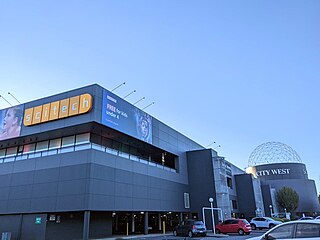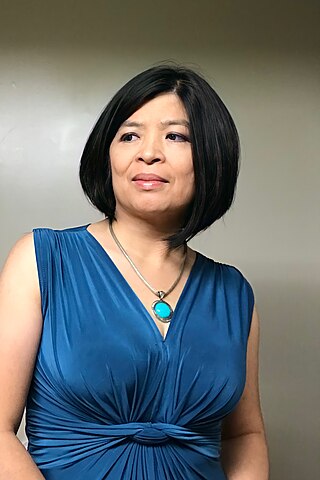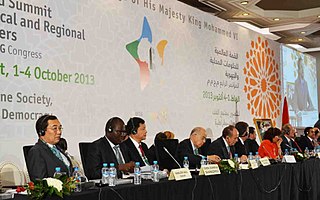Related Research Articles

A science museum is a museum devoted primarily to science. Older science museums tended to concentrate on static displays of objects related to natural history, paleontology, geology, industry and industrial machinery, etc. Modern trends in museology have broadened the range of subject matter and introduced many interactive exhibits. Modern science museums, increasingly referred to as 'science centres' or 'discovery centres', also feature technology.

The Pacific Community (PC), formerly the South Pacific Commission (SPC), is an international development organisation governed by 27 members, including 22 Pacific island countries and territories around the Pacific Ocean. The organisation's headquarters are in Nouméa, New Caledonia, and it has regional offices in Suva, Pohnpei, and Port Vila, as well as field staff in other locations in the Pacific. Its working languages are English and French. It primarily provides technical and scientific advice, and acts as a conduit for funding of development projects from donor nations. Unlike the slightly smaller Pacific Islands Forum, PaciCom is not a trade bloc, and does not deal with military or security issues.

Auckland University of Technology is a university in New Zealand, formed on 1 January 2000 when a former technical college was granted university status. AUT is New Zealand's third largest university in terms of total student enrolment, with approximately 29,100 students enrolled across three campuses in Auckland. It has five faculties, and an additional three specialist locations: AUT Millennium, Warkworth Radio Astronomical Observatory and AUT Centre for Refugee Education.
In international relations, public diplomacy broadly speaking, is any of the various government-sponsored efforts aimed at communicating directly with foreign publics to establish a dialogue designed to inform and influence with the aim of building support for the state's strategic objectives. These also include propaganda. As the international order has changed over the twentieth century, so has the practice of public diplomacy. Its practitioners use a variety of instruments and methods ranging from personal contact and media interviews to the internet and educational exchanges.

Scitech is a not-for-profit company encompassing the Scitech Discovery Centre, an interactive science centre in West Perth, Western Australia, outreach programs, professional learning programs and digital content.
Divers Alert Network (DAN) is a group of not-for-profit organizations dedicated to improving diving safety for all divers. It was founded in Durham, North Carolina, United States, in 1980 at Duke University providing 24/7 telephonic hot-line diving medical assistance. Since then the organization has expanded globally and now has independent regional organizations in North America, Europe, Japan, Asia-Pacific and Southern Africa.

Merlyna Lim is a scholar studying ICT, particularly on the socio-political shaping of new media in non-Western contexts. She has been appointed a Canada Research Chair in Digital Media and Global Network Society in the School of Journalism and Communication Carleton University. Formerly she was a visiting research scholar at Princeton University's Center for Information Technology Policy and a distinguished scholar of technology and public engagement of the School of Social Transformation Justice and Social Inquiry Program and the Consortium for Science, Policy and Outcomes at Arizona State University. She previously held a networked public research associate position at the Annenberg Center for Communication at the University of Southern California, Los Angeles. She received her PhD, with distinction, from University of Twente in Enschede, Netherlands, with a dissertation entitled @rchipelago Online: The Internet and Political Activism in Indonesia.
John Hartley, , FAHA,, FLSW, ICA Fellow, is an Australian academic and a John Curtin Distinguished Emeritus Professor. He was formerly Professor of Cultural Science and the Director of the Centre for Culture and Technology (CCAT) at Curtin University in Western Australia, and Professor of Journalism, Media and Cultural Studies at Cardiff University. He has published over twenty books about communication, journalism, media and cultural studies, many of which have been translated into other languages. Hartley is an adjunct professor with CCAT.

United Cities and Local Governments (UCLG) is an umbrella international organisation for cities, local and regional governments, and municipal associations throughout the world that is concerned with representing and defending the interests of local governments on the world stage.

East Asia is a geographical and cultural region of Asia including the countries of China, Japan, Mongolia, North Korea, South Korea, and Taiwan. Additionally, Hong Kong and Macau are the two special administrative regions of China. The economies of China, Japan, South Korea, and Taiwan are among the world's largest and most prosperous. East Asia borders North Asia to the north, Southeast Asia to the south, South Asia to the southwest, and Central Asia to the west. To its east is the Pacific Ocean.

The Public Relations Institute of Australia (PRIA) is a peak body for public relations and communication professionals in Australia. It promotes high ethical standards in the public relations and communication industry through accredited membership, resources, training, and recognition.

Massimiano Bucchi is an Italian sociologist, writer, and professor of science and technology in society at the University of Trento (Italy). His works are in the area of science in society, science communication and the social implications of technologies and innovation.
ASPAC may refer to:
Professor Gerard Goggin is an Australian media and communications researcher at the University of Sydney. He has produced award-winning research in disability and media policy alongside other contemporary works on digital technology and cultures.

The Asia-Pacific Advanced Network (APAN) is a not-for-profit association of Asia-Pacific national research and education networks (NRENs) incorporated in Hong Kong as a company limited by guarantee. The organisation was originally formed on 3 June 1997 and was incorporated on 8 August 2009.
The East Asian Bureau of Economic Research (EABER) is a forum for economic research and analysis of the major issues facing the economies of East Asia.
Dal Yong Jin is a media studies scholar. He is Distinguished SFU Professor in the School of Communication at Simon Fraser University, Vancouver, Canada where his research explores digital platforms, digital games, media history, political economy of communication, globalization and trans-nationalization, the Korean Wave, and science journalism. He has published more than 30 books and penned more than 200 journal articles, book chapters, and book reviews. Jin has delivered numerous keynote speeches, conference presentations, invited lectures, and media interviews on subjects such as digital platforms, video games, globalization, transnational culture, and the Korean Wave. Based on his academic performance, he was awarded the Outstanding Scholar Award from the Korean American Communication Association at the KACA 40th Anniversary Conference in 2018, while receiving the Outstanding Research Award from the Deputy Prime Ministry and Minister of the Education of South Korea. He was also awarded ICA Fellow, which is primarily a recognition of distinguished scholarly contributions at the International Communication Association Conference held in Paris in 2022. Jin has been interviewed by international media outlets, including The Wall Street Journal, Elle, New York Times, The Washington Post, NBC, The Guardian, The Vancouver Sun, Chicago Tribune, The Telegraph, Wired, LA Times, and China Daily as one of the world’s leading scholars on Korean pop culture and these subject matters.

The Guangdong Science Center is a major science center established in 2008 in Guangzhou, Guangdong, China.
Hildegard Katharina Vieregg is a museologist and museum professional, an educator, a university professor and lecturer, author, editor and administrator. She has contributed in important way to museums, to the International Council of Museums and to its International Committee for Museology. Her research interests include memorial sites, resistance against the Nazi totalitarian regime and museology as a science.
The European Network of Science Centres and Museums (ECSITE), is a not-for-profit organisation initiated in 1989.
References
- ↑ Routledge handbook of public communication of science and technology (2nd ed.). Abingdon, Oxon: Routledge. 2014. p. 56. ISBN 9781135049478.
- ↑ Bruyas, Anne-Marie; Riccio, Michaela (2013). Science centres and science events : a science communication handbook. Milan: Springer. p. 55. ISBN 978-88-470-2556-1.
- ↑ Gascoigne, Toss; Schiele, Bernard; Leach, Joan; Riedlinger, Michelle; Massarani, Luisa; Lewenstein, Bruce V.; Broks, Peter (2020). Communicating science : a global perspective. Canberra, ACT, Australia. p. 752. ISBN 9781760463663.
{{cite book}}: CS1 maint: location missing publisher (link) - ↑ "ASPAC 2013 to be Held in Korea". moe.go.kr. Republic of Korea: Ministry of Education. 19 April 2012. Retrieved 5 September 2024.